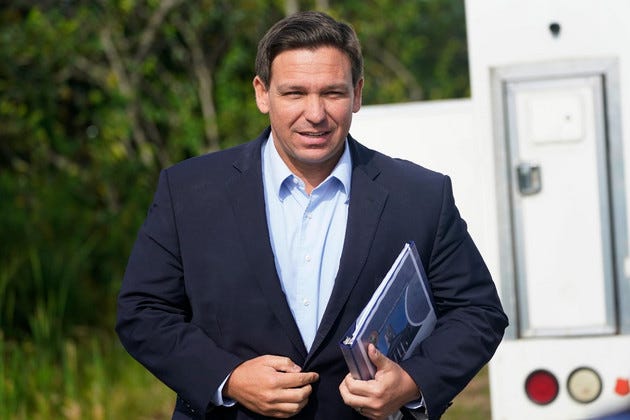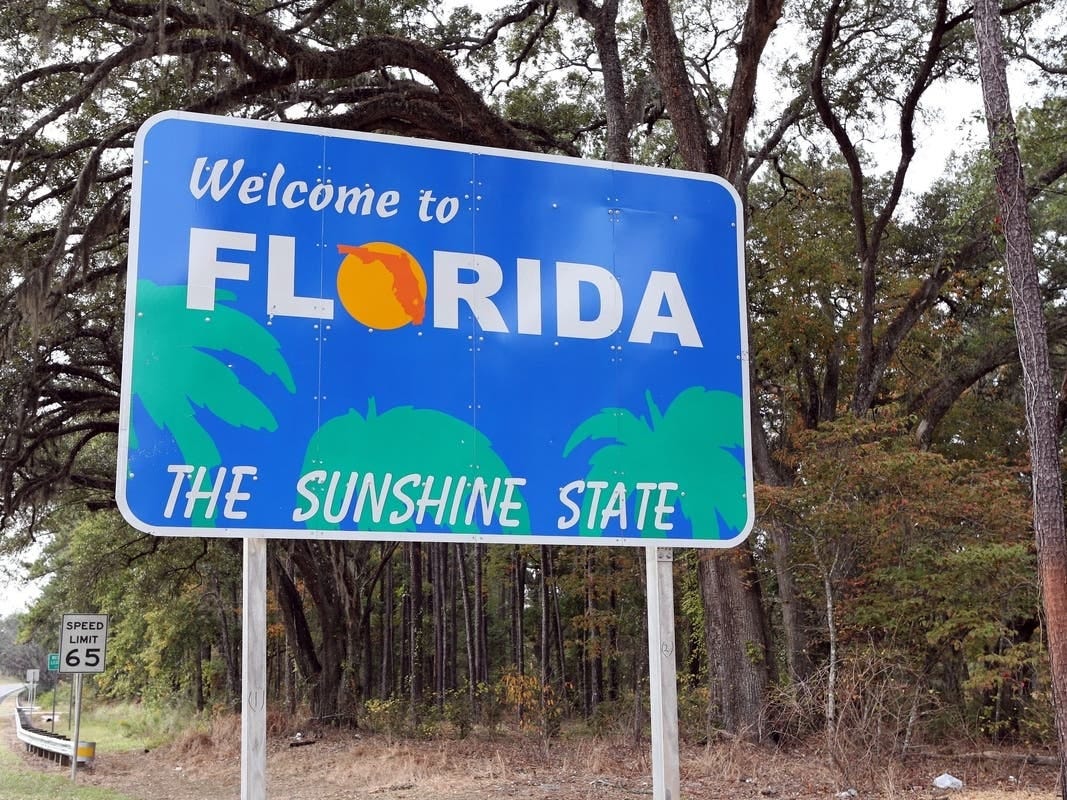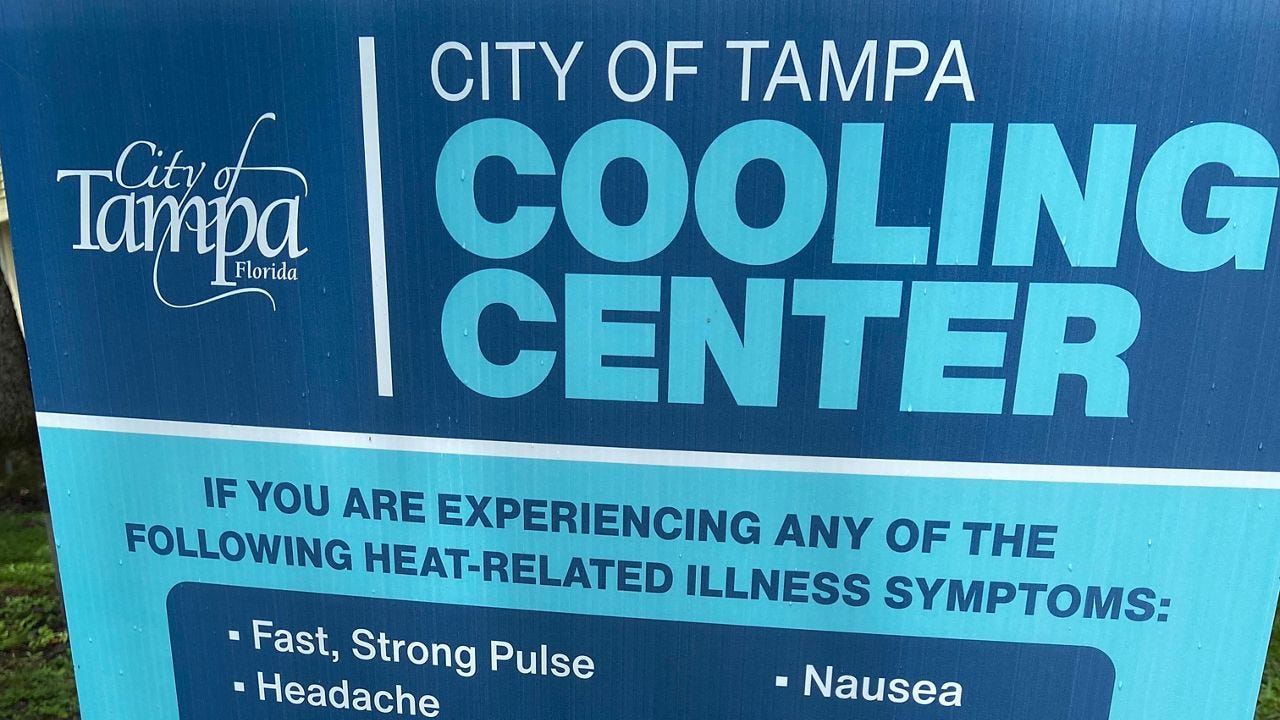Hurricane Idalia batters Florida & the most challenged books in Florida schools
August 31, 2023 — This Week's Top Stories in Florida
Welcome to this week’s edition of Floridian Today, a newsletter about all things Florida — from politics, business, real estate, and climate. Reporting from the Sunshine State, these are the most important stories you need to know. To never miss an update, subscribe here:
Here’s the latest from Florida…
Hurricane Idalia makes landfall as Category 3 storm, batters the Gulf Coast
Floridians spent the week bracing for Hurricane Idalia, which made landfall near Keaton Beach in the Big Bend region just before 8:00 AM on Wednesday. The hurricane strengthened briefly to a Category 4 storm overnight before being downgraded and striking Florida with maximum sustained winds of 125 mph. The storm surge damage brought by Idalia could extend about 200 miles along Florida's west coast and led to flooded streets and buildings, eroded beaches, toppled trees, and widespread power outages. By 2:00 PM Wednesday, there were over 270,000 reported power outages in the state, with most concentrated in northern counties. Some counties such as Taylor, Lafayette, and Suwannee saw as many as 80% of customers without power. Storm surge was the biggest threat with forecasts predicting up to 12 to 16 feet with water levels expected during high tide in the late afternoon on Wednesday. Preliminary data shows St. Petersburg and Tampa experienced between 3 to 5 feet of surge, and in Steinhatchee, located in the Big Bend region, water levels climbed from 1 foot to 8 feet in just an hour. Parts of the state witnessed wind gusts in excess of 100 mph and more than 5 inches of rainfall. Despite a series of strong hurricanes impacting Florida in recent years, Hurricane Idalia marked Apalachee Bay’s first recorded major hurricane since record-keeping began in 1851.
By Wednesday evening, Idalia was downgraded to a tropical storm, with sustained winds below 70 mph as it cut across southern Georgia and parts of South Carolina. Storm surge warnings and watches were also discontinued for Florida. With the storm having left the state, air travel is slowly returning to normal. Tallahassee International Airport reopens Thursday morning and Gainesville Regional Airport reopened Wednesday night. Tampa International Airport reopened for arriving flights beginning at 4:00 PM on Wednesday after sustaining minimal damage and will return to normal operations early Thursday morning. Post-storm assessments are also underway and will continue to inform decision-making in anticipation of future natural disasters. As it is clear in Tampa Bay, despite being spared once again from a direct hit, the storm surge effects from wind and rain highlight the region's vulnerability to major storms and the catastrophe that would ensue with a direct impact. Tampa Bay reported the highest storm surge since 1921, when the last major hurricane hit the area.
In the days leading up to the storm’s landfall, Gov. Ron DeSantis declared a state of emergency in 49 counties across the northern half of the state, extending from the Gulf Coast to the Atlantic Coast. DeSantis left the presidential campaign trail behind in Iowa on Saturday night, announcing the suspension of his White House bid, and flying back to Tallahassee to manage the impending crisis in his home state. Hurricane Idalia marks a critical juncture for the Republican governor as he faces challenges in navigating his governorship and presidential bid. His response to the hurricane and recovery efforts will be closely watched by political opponents, pundits, and voters alike. While no leader would view a hurricane as an opportunity, past storms have influenced governors' legacies, and DeSantis is the first sitting governor ever to face this test while in the midst of a presidential campaign.
The most challenged books in Florida schools
Advocates across Florida counties have raised concerns and brought controversy to school districts about certain books in public school libraries, leading to approximately 1,100 complaints against over 680 titles during the past year. A Tampa Bay Times analysis of public records from 62 school districts revealed that while most books received one or two complaints, a handful faced recurring objections. Many flagged titles gained attention from groups like Moms for Liberty or were featured on BookLooks.org, highlighting "objectionable content, including profanity, nudity, and sexual content." The complaints mostly centered around explicit or graphic violence, sex, gender identity, and drug use, with critics contending that such content could negatively impact young readers. Here are the four most objected-to titles:
"Sold," by Patricia McCormick - Challenged in 11 districts, restricted or banned in six.
"Tricks," by Ellen Hopkins - Challenged in 10 districts, restricted or banned in five.
"Crank," by Ellen Hopkins - Challenged in 9 districts, restricted or banned in four.
"PUSH," by Sapphire - Challenged in eight districts, restricted or banned in all eight.
Additional titles, such as "Damsel," "Milk and Honey," "The Kite Runner," "The Sun and Her Flowers," and "Tilt," all faced complaints in seven counties each.
During the previous legislative session, Florida lawmakers mandated that all 67 public school districts disclose which books faced challenges and removals in the past year, along with the reasons. The reports to the state Department of Education revealed that of the approximately 1,100 registered complaints, over 700 originated from two individuals–a father in Clay County and a high school teacher in Escambia County. The two counties combine to make up less than 3% of the state’s public school enrollment but more than 63% of total book complaints. Most districts had no formal challenges. Florida ranks No. 2 in the country for most book bans.
Florida education officials approve new rules for schools
State education officials have signed off on new rules for book challenges and restroom use in schools following controversial new laws passed by lawmakers months ago. Despite objections from critics, the approved rules allow parents to object to library materials and bring in a state magistrate if they disagree with the school district's resolution. This change came alongside opposition to the book challenge process that observers say results in a loss of literature availability for younger readers and limits access to LGBTQ+ content. The newly approved rules also govern restroom use on state college campuses, requiring individuals to use facilities that align with their biological gender at birth. This rule now applies to private schools. Additionally, the state law definition of "gross immorality and acts of moral turpitude" in teacher discipline cases has been expanded to include exposing students to explicit content, such as pornography and adult live performances. Despite vocal concerns, education officials defended the rules, stating that quality reading materials will still be accessible to students.
Taxpayers have spent $13M for DeSantis’ travel, security
Florida taxpayers have shelled out over $13 million for travel and protective security for Governor Ron DeSantis in the last two years as he campaigned for re-election and prepared for his 2024 Republican presidential campaign, state records reveal. The expenses incurred during the 2021-22 and 2022-23 budget years exceed the sums spent during his initial two years in office and dwarf spending by other states on their governors’ presidential bids. Florida's policy obliges taxpayers to cover travel and 24/7 security costs even during political campaigns or personal trips. Over DeSantis’ first four years in office, travel and security detail costs totaled more than $22 million for the governor and his family. The tab ran higher when the Republican’s security detail was augmented due to his elevated profile, partly owing to his national prominence and rising star status. During the 2022-23 budget year that concluded on June 30, the state allocated over $3 million for DeSantis' travel expenses and more than $5 million for his security detail, as reported by FDLE’s Transportation and Protective Services Report. This marked a 69% surge compared to the prior fiscal year of 2021-22, during which the state disbursed $4.7 million to cover the governor's travel and security expenses while he toured the state during his re-election campaign. Despite DeSantis raising over $100 million for his campaign, none has been used to reimburse taxpayers.
Federal judge rejects Florida law restricting Chinese ownership of land
A federal judge has rejected a request to temporarily halt the state’s new law restricting property ownership by individuals from China, aiming to limit the influence of the Chinese government and Chinese Communist Party in Florida. U.S. District Judge Allen Winsor stated that the plaintiffs in the lawsuit were unlikely to prove that the law was motivated by discrimination or lacked a “rational basis.” The law, approved by the Republican-led Legislature and signed by Gov. Ron DeSantis, seeks to curb land ownership of Chinese nationals or entities in the state. The lawsuit, supported by the U.S. Department of Justice, argued that the law violated constitutional equal-protection rights and the federal Fair Housing Act, but the judge found insufficient evidence to support the claims. This included citing U.S. Supreme Court precedents that have “held that states could deny aliens ownership interests in land within their respective borders absent an arbitrary or unreasonable basis.” The case is now headed to a federal appeals court in an attempt to overturn the judge’s decision to reject a preliminary injunction against the law.
Gulf of Mexico reaches record-high temperatures
The Gulf of Mexico is setting unprecedented heat records, with water temperatures soaring to new heights, raising concerns about the upcoming hurricane season. The scorching waters serve as a power boost for storms, as hurricanes thrive on warmth. The Gulf's sea surface temperature currently averages 88°F—2.6°F above normal and 1.2°F beyond historical highs. Eastern Gulf waters along Florida's west coast are even warmer, toggling between 91 to 94°F and hovering around record levels. This exceptional heat is attributed to erratic weather patterns, but fundamentally, scientists say human-induced climate change is the driving force. As tropical waters warm, every 1°F increase in sea temperature potentially escalates a storm's strength by 10%. With Gulf waters 2.6°F above normal, experts predict an increase in major hurricanes with an escalated probability of higher maximum winds, but that relies on perfect conditions being met. With this year’s strengthening El Niño, the threat of a major hurricane developing is somewhat reduced, although rising ocean temperatures will likely lead to a larger fraction of intensifying storms in the years ahead.
International tourism to Florida reaches post-pandemic high while domestic travel drops
Florida's second-quarter tourism figures took a dip in 2023, with a 1.2% decrease compared to the same period in 2022, according to estimates released by the state's tourism marketing agency. Despite drawing around 33.092 million visitors during the quarter, slightly ahead of the 2022 record pace, tourists from other U.S. states, who constitute the majority of Florida travelers, declined by an estimated 2.4% from the same 2022 period. Dana Young, President and CEO of Visit Florida, attributed the decline to heightened competition from other states and countries that had longer pandemic-related shutdowns. However, international tourism in Florida has seen an increase this year. The total visitors for the first half of 2023 were up 1.3% compared to 2022, surpassing pre-pandemic levels. An estimated 1.941 million overseas visitors traveled to the state in the second quarter of the year, up from 1.748 million during the same period last year.
Ethics commission chairman resigns amid conflict of interest
Glen Gilzean, the Chairperson of Florida's ethics commission, has resigned following a conflict of interest involving his job as administrator of the Central Florida Tourism Oversight District, which oversees the special taxing district comprised of Walt Disney World. Gilzean's $400,000-a-year role with the Disney district—held since May—posed a potential conflict with his position on the nine-member state ethics commission, tasked with investigating complaints of “breach of the public trust by public officers and employees.” State law prohibits ethics commissioners from holding "public employment," but Gilzean claimed he was unaware of the potential conflict until media reports highlighted it. However, the ethics commission's general counsel contradicted this, stating in a legal memo his team had discussed the issue with Gilzean in late April. The DeSantis-appointee’s dual roles were brought to public attention last week by the investigative news website, Florida Bulldog, which led the then-ethics chair to request a legal opinion from the commission. This resulted in the ethics commission’s general counsel concluding that Gilzean must resign from one of his roles.
Tampa’s cooling centers see little use amid excessive heat
Amid scorching summer heat, Tampa's cooling centers for the homeless have seen limited usage. As temperatures soared and heat advisories were issued, the city’s parks and recreation department established cooling centers at three parks on August 10, offering refuge, snacks, and water to unhoused individuals. Despite the effort, the centers had little foot traffic. Records show that only around 282 visitors used the facilities across the week, averaging approximately 13 visitors per center daily. Many of the city’s homeless and related organizations were unaware of the centers' existence, according to the Tampa Bay Times. The lack of use of these facilities during recent heatwaves highlights the opportunity for improved outreach and accessibility to cooling facilities, especially as extreme conditions become more frequent and prolonged.
Tampa’s proposed tax hike receives opposition
Tampa Mayor Jane Castor's push for a tax hike encountered a setback as a citizens advisory committee recommended the City Council reject the proposed double-digit property tax rate increase. The city council-appointed citizens advisory budget and finance committee expressed concerns about transparency regarding how the additional tax revenue would be utilized. One member criticized the lack of information on where the money would go, stating citizens lacked crucial details. Castor had emphasized the 16% tax increase is necessary to address maintenance projects, parks, transportation, housing, and public safety priorities. However, scrutiny revealed confusion over the allocation of funds that would deliver $45 million in new investments. For example, the proposed budget was presented as boosting public safety jobs but many of those police and fire positions would be grant-funded and are not included in the budget. The City Council is set to make a final vote on the budget after public hearings on September 19.
DeSantis presidential campaign yields financial support from Florida insiders
As Gov. DeSantis travels across the U.S. to broaden his appeal and bolster his White House bid, he has received substantial financial support from Tallahassee, the Florida capital city where he both governs and wields political influence. Approximately $500,000 in campaign funds have poured into DeSantis' political operation from Tallahassee-based donors through June 2023, according to campaign financial disclosures. The monetary contributions directly to the DeSantis campaign and his super PAC have come from lobbyists, government contractors, and staff members of his office. Moreover, heads of state agencies, all appointed or recommended by DeSantis, have contributed to his campaign. While such financial backing from his base of insiders is unsurprising, it raises questions about his campaign’s ability to scale and attract national support. There are additional concerns of the Republican governor’s official duties merging with his political activities. In the spring, while DeSantis was considering the budget and determining which items to veto, aides in the executive office asked lobbyists for campaign contributions, implying that their client’s projects could face the governor’s veto pen. Tallahassee donors to the DeSantis campaign have given the second-most of any other city in the U.S. after New York City. Moreover, administration employees have given at least $30,000 to the governor’s bid – more than any other Florida agency. State lawmakers added another $27,000. Executives of companies that secured state government contracts gave more than $230,000. Meanwhile, Las Vegas aerospace and real estate billionaire Robert Bigelow has contributed the single most to the DeSantis campaign via his super PAC, pledging more than $20 million.
Florida Capitol gets $61M in security upgrades
As part of a $172 million renovation project, the Florida Capitol will receive bulletproof windows and other security enhancements to protect and modernize the complex. Lawmakers had previously approved a $61.6 million window replacement project as part of a broader Capitol renovation initiative carried out in phases. The aging, non-ballistic windows are being replaced, alongside the removal of rusty metal louvers. The decision aims to increase energy efficiency while delivering enhanced security, reflecting the current political climate. Other security measures installed as part of the renovations include bulletproof panels along the daises in committee hearing rooms. While security enhancements are acknowledged by most, some have pointed to the hypocrisy as lawmakers have relaxed gun laws this past legislative session, allowing concealed carry without a permit. The ongoing renovations to the Capitol complex are estimated to be completed in 2027.
Luxury St. Petersburg condo faces $45M in major repairs
Bayfront Tower, a luxury condominium situated along Beach Drive in downtown St. Petersburg, is facing a major renovation project with an estimated cost ranging from $30 million to $45 million. The reason behind this significant undertaking? A host of major structural issues that engineers uncovered during a thorough inspection ordered by the Bayfront Tower Board of Directors. The decision for the inspection was prompted by the tragic collapse of the Champlain Towers South Building in Surfside back in 2021, which resulted in 98 fatalities and spurred Florida lawmakers to revise the state's condo safety regulations. While the building was declared structurally sound, the inspection revealed problems with post-tension cables, metal framing, stucco, garage concrete, and the roof. New state legislation requires three-story or taller condos to undergo inspections every 10 years and to examine their reserve funds to ensure financial resources to perform necessary building upkeep. The changes have revealed the consequences of years of deferred maintenance, resulting in condo associations grappling with the costly challenge of bringing their buildings up to the new standards. For Bayfront Tower, the costs of the extensive repairs will be covered by condo owners through special assessments, imposing a necessary financial burden to establish the long-term safety and viability of the building. It is part of a broader trend across the state, as many condo associations are realizing the importance of regular maintenance and adhering to stricter safety regulations that force them to be proactive in planning for the future.
Pets Not Welcome: Publix’s new policy tells customers to keep the pets at home
Publix, the beloved supermarket chain deeply ingrained in Florida's culture, sends a clear message to its customers: only legitimate service animals are allowed inside their stores, and emotional support animals or regular pets are prohibited. Tall green signs have started appearing in Publix store lobbies across the state, reminding patrons of this policy. While federal law defines service animals as dogs or miniature horses trained to assist people with disabilities, emotional support animals and pets do not qualify under this definition. This move by Publix, though prompted by unknown reasons, has largely drawn praise from customers. Citing concerns about potential conflicts between dogs and shoppers, the sanitary nature of animals in close contact with food, and other reservations about having untrained pets in a grocery store setting have led many shoppers to welcome the adherence to the rules. The signs also highlight that trying to pass off a pet as a service animal is against the law in Florida and other states. With a reputation for superior customer service, Publix is likely aiming to ensure a comfortable shopping environment for all its customers.
Lawmaker introduces ‘Right to Rock’ bill that prevents venues from canceling shows due to politics
State Rep. Joel Rudman (R-Navarre) has introduced a bill known as the "Right to Rock Act" (HB 15) for consideration during Florida’'s 2024 legislative session, which begins in January. The bill aims to prevent entertainment venues that receive state funding from terminating contracts with performers based on their social media activity or political affiliations. The legislation would cover contracts involving musicians, comedians, dancers, and actors. The proposal is of personal significance to Rudman, as he is part of a classic rock cover band. His band's recent tour titled "God, Guns and Less Government" reportedly faced online trolling. A Facebook post by the Republican lawmaker claimed that he was targeted by liberals attempting to "cancel" him by spamming his Eventbrite page with fake information.
10,000+ gallons of raw sewage dumps into waters off St. Petersburg
Approximately 10,600 gallons of raw sewage entered Riviera Bay in St. Petersburg on August 17 following a sewage line break, according to city officials. The discharge entered the intracoastal waterway of Tampa Bay and resulted in road closures as a multiday repair operation commenced. The impacted area, which borders the biodiverse Weedon Island Preserve teeming with numerous plant and animal species, is currently under investigation by the Florida Department of Environmental Protection. Crews responded to the area and vacuumed about 200 gallons of raw sewage before it entered the bay, but an additional 600 gallons seeped into the waterway that day, adding to a total of 10,600 spilled gallons of sewage. Days after the incident was first reported, a city spokesperson stated that the spill had stopped, and all captured sewage would be treated at a wastewater facility. St. Petersburg intends to accelerate plans to replace the problematic pipe this year, instead of in 2025 as initially planned. The project could take two years to complete at an estimated cost of $3 million.
Mansion on Tampa’s Davis Islands sells for $17.8M
A 9,038 waterfront home on Tampa’s exclusive Davis Islands has sold for $17.85 million, marking the highest-priced home sale in the city this year. The expansive property was initially listed in February for $23.9 million, occupying 1.45 acres and boasting 464 feet of waterfront. Built in 1928, the home offers seven bedrooms, seven full bathrooms, two half-bathrooms, a gym, a wine cellar, and two office spaces. Notably, it sits on three buildable lots, potentially allowing for future redevelopment into separate properties. The buyer, Ladoga Avenue Trust, is represented by real estate attorney Maura A. Ziska. The former owners purchased the estate in 2012 for nearly $1.18 million.
Thanks for reading this edition of Floridian Today. To never miss an update, subscribe for free:
In the meantime, if you learned something or found this read interesting, please consider sharing it to grow our community!












